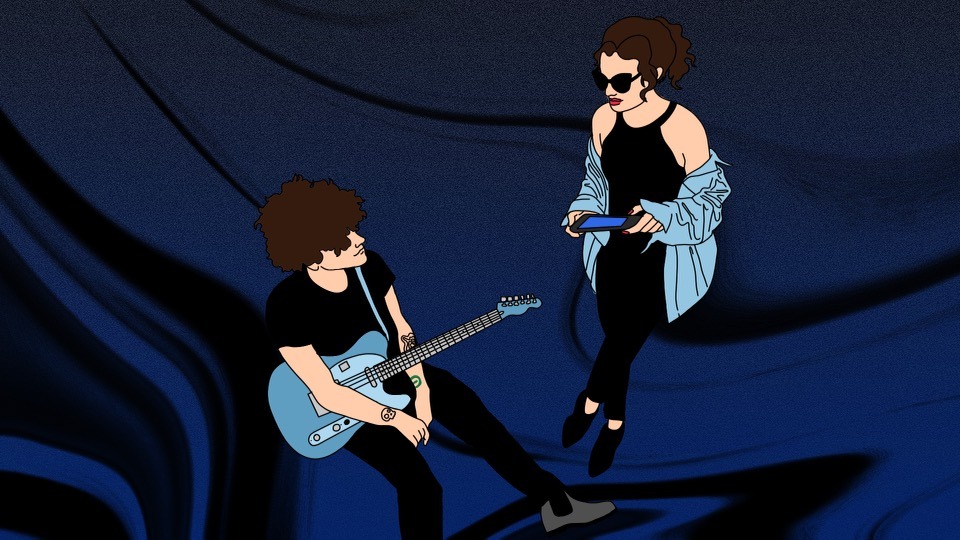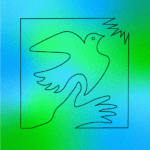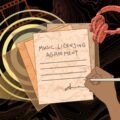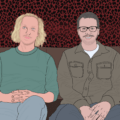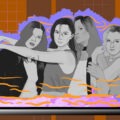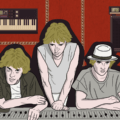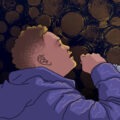Fusing the electro bombast of new wave pioneers Depeche Mode with the dark thematic content of Nick Cave’s best work, darkwave duo Gant have just unfurled their doomy first full-length LP on an unsuspecting world. Get ready for synths. Lots of synths.
Find Gant online
Gant 101: Cheat Sheet
Depeche Mode vs The Cure. Who wins?
GANT: Depeche Mode
One piece of gear you can’t live without:
MARÍA: A synth. Almost any synth, as long as it has a keyboard or can be plugged into one.
MARCO: Guitar
Favourite “I’m in a session” meal:
GANT: We like spicy chips
Most important trait in a bandmate:
MARÍA: That we understand each other artistically
MARCO: Good taste
Least favourite song by your favourite artist:
MARÍA: I honestly don’t know!
MARCO: “Just Can’t Get Enough” by Depeche Mode
Gant is a band that’s got its influences sewn firmly onto its sleeves. Their first full-length LP, Ghosts After Night Time, is a synth-laden testament to artists whose mere mention evokes genre-defining choruses, riffs, and signature sounds–think Radiohead, Depeche Mode, Nick Cave– but who are equally celebrated for their continual experimentation and reinvention.
In that spirit, the band, composed of Marco Arevalo and RAC grad María Casar, brings new textures to the post-punk genre, combining reverb-drenched shoegaze vocals with darker melodies that groove just a touch more than one might expect from such a brooding genre.
The final product, however, is far more than a sum of the duo’s influences. The creative partnership owes as much to geographical location–the group divide their time between the hustle and bustle of Toronto and Guadalajara, Mexico– as it does to their unique artistic backgrounds, visions and upbringings, and is essential in realizing Gant’s mission: to create a sentiment of compromise between human beings.
Originally the brainchild of Marco Arevalo, Gant began life in 2016 as a solo project in San Antonio, Texas. Marco knew from a young age that he wanted to do one thing: tell stories, no matter what. Finding a suitable medium was the issue. He studied audiovisual arts, intending to pursue sound design before fronting his first punk bands and writing his first Neil Young and Johnny Cash-inspired lyrics. It was just him, a few chords, and the truth. For Marco, the arts were the only way to leave something behind after you pass–a spiritual way to be yourself.
Settling on Gant as a project name and drawing inspiration from Austin’s folk and psych-rock scene, Arevalo now had a new problem: starting a folk band without musicians. His answer: drum machines and synthesizers.
Like Marco, María Casar had been involved in the arts in one way or another since she was little, expressing herself first through writing and drawing before exploring dance and ballet. Her grandfather first fostered her love of music, introducing her to Beethoven, Mozart, and Rachmaninov. As she transitioned into her teens and her interest in ballet eventually dwindled, music started to play a central role in her life. She started playing piano, studying audiovisual arts at ITESO university. She dove deep into the sub-genres of rock and started experimenting with her first DAW, Ableton.
Through their mutual love for Depeche Mode, Marco and María finally teamed up in 2018, with María bringing synths, songwriting contributions, and visual art into the mix. Their joint musical influences were disparate but brought a surprising cohesiveness to Gant’s sound. María brought her teenage love of classic rock and grunge to the table while exploring a wide range of bands, from Soda Stereo and Mecano to Suicide and Radiohead, to more contemporary acts like Sextile, Riki, Nick Cave and The Bad Seeds, and Viagra boys.
“On a global level,” María tells us, “there’s a lot of interest in genres with eighties roots, and that’s reflected in the music we listen to. What we like about post-punk and darkwave is the possibility to create all day in different spaces and moods. You can have introspective lyrics, a high or low BPM and still dance to it”.
Where Gant chooses to create music speaks to another duality that compliments their sound. Their hometown of Guadalajara has no prescribed music scene; it’s constantly evolving, with a vibrant, eclectic musical community where mariachi, blues or jazz all hold as much sway as hip hop or noise rock. Channelling the spirit of an old colonial town like Guadalajara while having the freedom to cull from such a wide range of influences has played an integral part in shaping Gant’s music in both sound and spirit.
On the flip side, there’s Toronto, where the band spent considerable time while María was completing her studies at RAC. “In Toronto, a big modern city, you wake up and feel that you have the opportunity to be someone different each day”, she tells us. “Toronto is maybe influenced by the New York scene and being a multicultural city, it’s a perfect space to find music from a wide variety of Influences”.
Education in music production has, first and foremost, given Gant full autonomy and control over their music. “Sometimes you want to collaborate with people, but for us, it’s an option more than a necessity”, María explains. “If you’re a composer and also a producer, you set the limits. And it doesn’t matter if you use hardware or software, Garage Band or Pro Tools, a studio or bedroom–the important thing is the outcome and that you find yourself creating from zero to one hundred”.
The differences in Marco’s and María’s artistic approach and the inherent compromise within their process ultimately help them achieve their goal as Gant: to create a sentiment of compromise between human beings–”what is good for you is good for me and is good for everyone”. For her creative process, María doesn’t contemplate right or wrong. Her goal is to evoke emotions that stem from her experiences in the world around her. There are no right or wrong emotions–they just are. For Marco, it’s important for him to give voice to the people who are no longer with us.
Ghosts After Night Time was born out of the global pandemic. Many of the album’s themes are rooted in the topic. As creators, Marco and María like to keep death present in their minds to remind themselves that they can’t allow themselves to be stagnant. They explain: “Even if everything seems to be falling apart, the creative process must continue. Through the arts, you can touch people and give them a shot of rawness and reality, all of this under the cloak of an aesthetic precept”.
Illustration by Malaika Astorga
